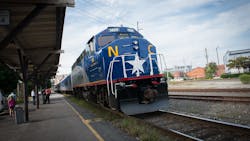North Carolina awarded $47.5 million CRISI grant to purchase freight line for future passenger service
Funds to purchase what is referred to as the missing link for future high-performance passenger service connecting Raleigh, N.C., and Richmond, Va., have been awarded by the U.S. Department of Transportation (USDOT) through the Consolidated Rail Infrastructure and Safety Improvements (CRISI) Grant program.
The $47.5 million CRISI grant will aid North Carolina Department of Transportation (NCDOT) in the purchase of a 10-mile section of rail line between Raleigh and Ridgeway. The section of track is part of the S-Line, an inactive freight rail line owned by CSX.
The deal enabling NCDOT to purchase the section of the S-Line was struck in December 2019 as part of a larger agreement between the Class 1 railroad and the Virginia Department of Rail and Public Transportation.
The line will be converted for use as part of the Southeast Rail Corridor, which plans to connect Washington, D.C., and Jacksonville, Fla. The Southeast Corridor was one of the first five federally-designated higher speed rail corridors in the country.
U.S. Sens. Thom Tillis (R-NC) and Richard Burr (R-NC) and Reps. David Price (D-NC) and G. K. Butterfield (D-NC) released the news of the CRISI grant.
“Preserving our rail systems is crucial to future tourism and economic growth, and this funding will help ensure the S-Line in Eastern North Carolina is secure for generations to come,” said Sen. Tillis.
Sen. Burr added that the grant award is a “huge win” for the state’s rail system.
“The S-Line currently serves as the missing link to the Southeast Corridor. This grant will be used to purchase the right of way to not only improve passenger rail access, but expand freight services in the state,” said Sen. Burr.
The funds to purchase the S-Line are a step toward delivering the project that will restore passenger service between Raleigh and Richmond through Petersburg. The project will provide a faster (up to 110 mph) and more direct route between Raleigh and Richmond.
“Developing intercity passenger rail service along the 'S-Line' corridor will improve mobility, bolster safety and reduce highway congestion between Raleigh and Richmond," said Rep. Price. "Today’s $47.5-million federal grant to NCDOT for right-of-way acquisition is a critical step forward in this process, which builds on years of collaboration between transportation officials in North Carolina, Virginia and the Federal Railroad Administration, as well as our congressional delegation.”
In North Carolina, the project will connect communities between Raleigh and the Virginia state line and will reduce the trip time from Raleigh to D.C. by up to 1.5 hours.
“Developing this rail line is a critical step in completing the Raleigh to Richmond portion of the Southeast Corridor. Today’s announcement begins what I hope will be a long line of future announcements on enhanced transportation, employment and economic development opportunities for North Carolina and, specifically, residents and businesses in Warren and Vance Counties,” said Rep. Butterfield.
About the Author

Mischa Wanek-Libman
Group Editorial Director
Mischa Wanek-Libman is director of communications with Transdev North America. She has more than 20 years of experience working in the transportation industry covering construction projects, engineering challenges, transit and rail operations and best practices.
Wanek-Libman has held top editorial positions at freight rail and public transportation business-to-business publications including as editor-in-chief and editorial director of Mass Transit from 2018-2024. She has been recognized for editorial excellence through her individual work, as well as for collaborative content.
She is an active member of the American Public Transportation Association's Marketing and Communications Committee and served 14 years as a Board Observer on the National Railroad Construction and Maintenance Association (NRC) Board of Directors.
She is a graduate of Drake University in Des Moines, Iowa, where she earned a Bachelor of Arts degree in Journalism and Mass Communication.
